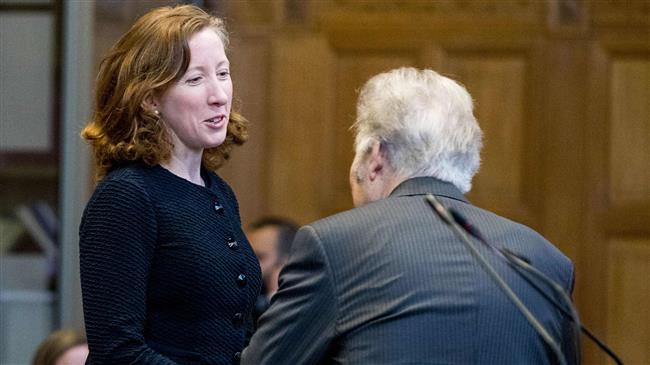US urges World Court to dismiss Iran’s lawsuit, insists sanctions lawful
US lawyers have called on the International Court of Justice (ICJ) – the United Nations' highest court -- to dismiss the Iranian lawsuit calling for a lifting of sanctions against the Islamic Republic and have insisted that sanctions are legal and needed.
Last month, Iran filed a complaint with the Hague-based tribunal, also known as the World Court, asking the principal judicial organ of the United Nations to order the US to lift its recently re-imposed sanctions on the Islamic Republic.
Tehran has called on the ICJ to order the immediate lifting of the sanctions, and demanded compensation for damages incurred in their wake.
Iran believes that the re-imposed American sanctions against Iran violate the terms of a 1955 friendship treaty between the two countries.
But US State Department Legal Adviser Jennifer Newstead argued on Tuesday, the second day of oral arguments in the case that Iran's appeal based on the 1955 Treaty of Amity, was a legal dodge.
"Iran is endeavoring to use the procedures of the Treaty of Amity to enforce rights that it claims under an entirely different (agreement) that specifically excludes judicial remedies," she told judges in the court's wood-paneled Great Hall of Justice
The oral arguments, essentially a request by Iran for a provisional ruling, will last for four days, with a decision to follow within a month.
Newstead argued that the disagreements between the United States and Iran should be resolved through diplomacy and not by the court.
Newstead further told the ICJ in The Hague that it "lacks prima facie jurisdiction to hear Iran's claims."
"The United States does intend, lawfully and for good reason, to bring heavy pressure to bear on the Iranian leadership to change their ways," she told judges. "We do this in the interests of US national security as well as in pursuit of a more peaceful Middle East and a more peaceful world."
The US re-imposition of sanctions against Iran came after US President Donald Trump pulled out of the 2015 nuclear deal known as the Joint Comprehensive Plan of Action (JCPOA) and set forth 12 new demands in order for the US to agree to a new nuclear deal with Tehran.
America’s European allies have protested against the move, but they are likely to adhere to the sanctions under the US pressure.
"This case is entirely about an attempt to compel the US by order of this court to resume" the 2015 nuclear deal, Newstead said.
The US decision to pull out was motivated by "an acute, long-standing and growing concern about the national security threat posed by Iran," she stated.
"The sanctions that the United States has re-introduced are lawful and appropriate in the face of Iran's activities, past, continuing and threatened," she claimed.
The ICJ was set up in 1946 to resolve international disputes. Its rulings are binding but on rare occasions they have been ignored by certain countries, chiefly the United States.
Jan. 15: ‘Axis of Resistance’ operations against Israeli occupation
VIDEO | US fires: Criticism mounts over govt. failure to respond
VIDEO | Fears, hope in Gaza amid intensified ceasefire efforts
VIDEO | Press TV's news headlines
Hamas: Ceasefire agreement result of steadfastness, resistance in Gaza over 15 months
Hamas thanks Iran, Resistance Front following achievement of ceasefire in Gaza
'Capitulation': Israeli officials and media concede Gaza defeat as truce unfolds
'Gaza has won': Social media users react to ceasefire with mix of relief, joy











 This makes it easy to access the Press TV website
This makes it easy to access the Press TV website